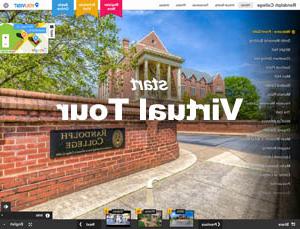Financial Aid
Other Types of Aid
Student Employment – Work Study
Student employment helps students earn money to meet educational costs while providing real-life work experience. Not only does student employment provide an income, but it also helps students learn time-management skills, teamwork, work ethic, and helps students develop their resume. Student employment is a benefit enjoyed by about 30% of the student body.
- For information or inquiries about student employment, students should contact studentemployment@518331.com.
- For information about the documents required and payroll information, you can visit the Student Employment page on the Human Resources site.
- Current Student Job Listings
- Student Employment FAQs
Monthly Payment Plan
Randolph College offers a monthly payment plan for families who wish to make monthly payments on a tuition bill. There is no interest, no finance charges, and only a $55 enrollment fee for using this service.
To take full advantage of the 10-month payment option, enrollment must be completed prior to June 1st each year.
Virginia Tuition Assistance Grant (VTAG)
A non-need based state aid option, available to Virginia residents who attend accredited private, nonprofit colleges and universities in Virginia (such as Randolph College) for other than religious training or theological education.
Annual Award Amount
- ~$5,250 for 2025-2026
- $5,125 for 2024-2025
Undergraduate students pursuing a career in teaching are eligible for an additional $500 VTAG bonus award during their senior year. Eligible programs are listed below:
- Elementary Education (BS)
- Physics Education (BA)
- Special Education (BS)
Application Deadlines
- Incoming students must submit their VTAG application by September 15 for fall start.
- Incoming students must submit their VTAG application by December 1 for spring start.
*Please note, returning students do not have to submit a VTAG application each year.
To Apply
- Students should visit our Financial Aid Forms page for the VTAG application.
Additional Resources
Two-Year College Transfer Grant (CTG)
Available to Virginia residents who first completed an associate degree at a Virginia public two-year college before transferring to a participating Virginia four-year college or university as a means to reduce the overall cost towards completing a bachelor’s degree.
Maximum annual standard award is $1,000. Students enrolled into a degree program in: science, teaching, engineering, or mathematics may be eligible for an additional $1,000.
Randolph College PLITT Student Loan
The Randolph College PLITT Student Loan is a college loan program that helps students bridge the gap between the Cost of Attendance and the student’s financial aid package. The maximum amount available each year through this loan program is $10,000. The interest rate is 3.5% with a loan repayment term of 96 months (8 years). Repayment begins around 30 days after the loan is disbursed to the student’s account. Both the student borrower and the cosigner will undergo a credit check for this loan.
Applications for the 2024-2025 academic year are available NOW! Applications for the 2025-2026 academic year will be available May 1, 2025.
To ensure adequate processing time, completed PLITT Loan Application deadline is August 1, 2024.
- To apply for a PLITT Loan, please email financialaid@518331.com or call at 434-947-8128.
- PLITT Loan Program Information
- Once the loan is disbursed, bills are sent by loan servicer, Heartland-ECSI. They can be reached at 888-549-3274.
Federal Parent PLUS Loan
Parents (of dependent students) may qualify to borrow under the federal Parent PLUS Loan program for loan funds to pay the cost of tuition and other education related expenses. The lender for the PLUS Loan is the U.S. Department of Education, and the loan offered a fixed interest rate of 9.08% for the 2024-2025 year (through June 30, 2025) with a loan repayment term of 10 years. Parents may borrow up to the Cost of Attendance minus all other financial aid awarded. Deferred repayment is an option. The borrower (parent) will undergo a credit check for this loan.
Applications for the 2024-2025 academic year are available NOW! Applications for the 2025-2026 academic year will be available May 1, 2025.
Alternative (Private) Loans
Alternative student loans are loans in a student’s name for which they may need a qualified cosigner. Randolph College works with a number of lenders who are committed to the student education loan industry. However, if a student chooses to borrow from another lender, Randolph College will certainly accommodate their choice. Interest rates can be fixed or variable, and loan repayment options can vary. Students may borrow up to the Cost of Attendance minus all other financial aid awarded.
Alternative (or private) loans are offered by private lending institutions and are not guaranteed by the federal government and do require a credit check for both the student borrower and the cosigner (if applicable).
These funds can be available to students who may not be eligible for federal loans or who may need additional funding to cover the total cost of attendance.
Students should exhaust federal loan opportunities first. Federal loan program provisions may be more favorable than those of alternative/private loans.
Additional Resources:
- Private vs. Parent PLUS Loan (for parents of undergraduate students)
- Private vs. Grad PLUS Loan (for graduate students)
Virginia Alternative State Aid (VASA)
Virginians who are nonimmigrants, undocumented, have Deferred Action for Childhood Arrivals (DACA) status or are otherwise ineligible to file the FAFSA and would like to be considered for state financial aid. You can view more details on the VASA Application process and requirements here.
The VASA application provides access only to need-based state financial aid.



